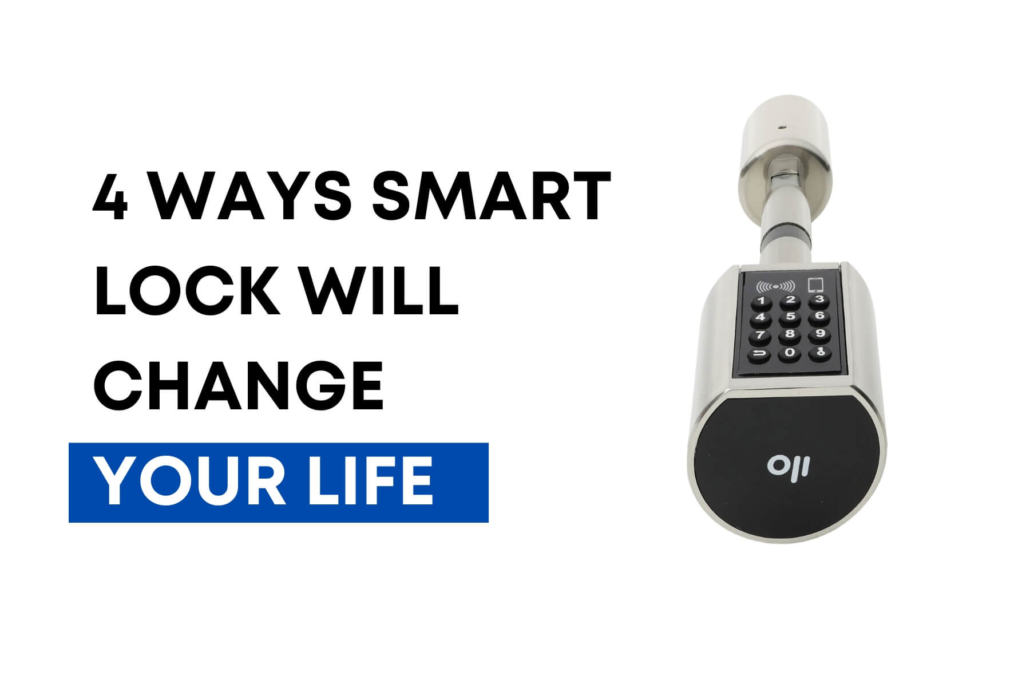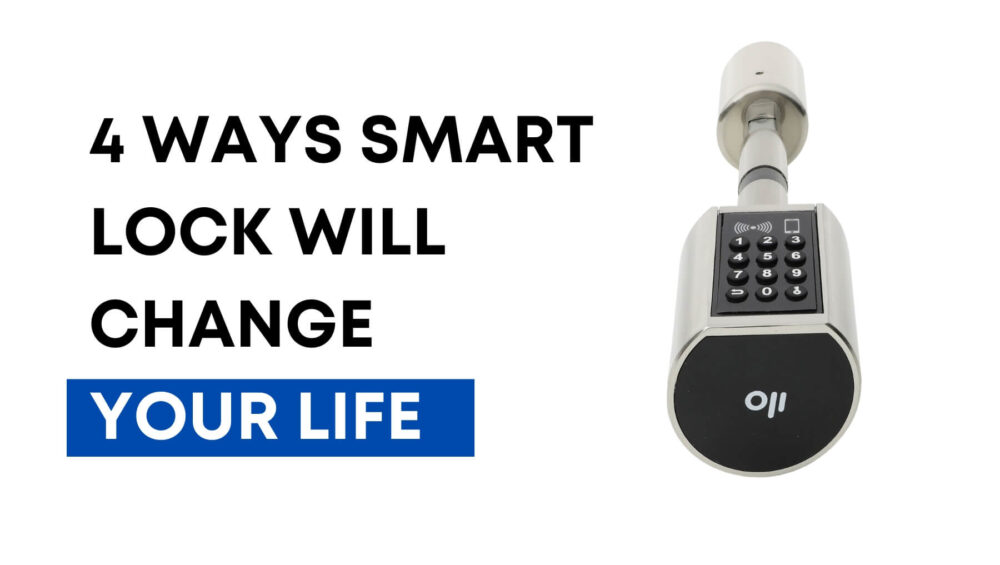
4 Ways Smart Door Locks will change your life
Introduction
Smart door locks are revolutionizing the way we secure our homes and businesses, making safety smarter and life simpler. As technology weaves itself deeper into our everyday routines, it’s only natural to expect our security systems to keep pace. In this blog post, we’ll uncover four incredible ways smart door locks are not just meeting but exceeding these expectations, transforming our lives with unmatched convenience, enhanced security, and cutting-edge efficiency. Let’s dive into the future of security with smart door locks!
Enhanced Security
One of the most significant benefits of smart locks is the added layer of security they provide. Traditional locks can be easily picked or tampered with, but smart locks offer more sophisticated protection through encryption and advanced locking mechanisms. Additionally, smart locks can be integrated with other security systems, allowing you to monitor your home or business from anywhere in the world.
- Encryption and Secure Communication
Encryption: Smart locks use advanced encryption methods to protect your data and ensure secure communication between the lock and your device.
Secure Communication Protocols: Many smart locks utilize secure communication protocols, such as AES 128-bit encryption, to prevent unauthorized access and tampering.
- Advanced Locking Mechanisms
Tamper-Resistant Design: Smart locks often feature tamper-resistant designs to deter physical attacks or attempts to pick the lock.
Anti-Lock Bumping: Some smart locks include anti-lock bumping technology, which prevents intruders from using the “bumping” technique to gain access.
- Customizable Access Codes and Permissions
Unique Access Codes: Smart locks allow you to create unique access codes for different users, making it easier to monitor and control who has access to your property.
Time-Based Permissions: You can set time-based permissions for specific users, granting temporary access for guests, contractors, or service providers.
- Integration with Other Security Systems
Smart Home Integration: Many smart locks can be integrated with other smart home security devices, such as cameras, alarms, and sensors, creating a comprehensive security ecosystem.
Remote Monitoring: Integration with other security systems allows you to remotely monitor your property and receive real-time notifications in case of any security breaches or suspicious activities.
- Audit Trails and Access Logs
Audit Trails: Smart locks often provide detailed audit trails, allowing you to review the history of access events, including dates, times, and user identities.
Real-Time Notifications: Some smart locks send real-time notifications to your smartphone or other devices whenever your door is accessed, giving you instant insight into the security status of your property.
Keyless Convenience
Gone are the days of fumbling for your keys or worrying about losing them. Smart locks provide keyless entry, allowing you to unlock your door using a smartphone, keypad, or even biometric authentication methods like fingerprint scanning. This convenience not only saves time but also eliminates the risk of unauthorized key duplication.
- Multiple Access Methods
Smartphone App: Many smart locks allow you to unlock your door using a dedicated smartphone app, eliminating the need for a physical key.
Keypad: Some smart locks feature built-in keypads, enabling you to enter a unique access code for entry.
Biometric Authentication: Advanced smart locks may offer biometric authentication, such as fingerprint or facial recognition, for a more secure and personalized access method.
2. Remote Access and Control
Remote Unlocking: With smart locks, you can remotely unlock your door for guests, service providers, or family members from anywhere with an internet connection.
Temporary Access: Grant temporary access to your property by creating time-limited access codes or virtual keys for specific users.
- Auto-Locking and Unlocking
Auto-Locking: Smart locks can be set to automatically lock after a certain period, ensuring your property remains secure even if you forget to lock the door.
Auto-Unlocking: Some smart locks use geofencing or Bluetooth proximity to automatically unlock the door as you approach, providing a seamless entry experience.
- Integration with Smart Home Ecosystems
Voice Commands: Many smart locks can be integrated with smart home assistants, like Amazon Alexa, Google Assistant, or Apple HomeKit, allowing you to control your lock with voice commands.
Automated Routines: Smart locks can be incorporated into automated routines, such as triggering lights or adjusting the thermostat when the door is unlocked.
- Lost Key Prevention
No More Lost Keys: With keyless entry methods, you no longer need to worry about losing your keys or getting locked out of your home or office.
No Unauthorized Key Duplication: Keyless entry eliminates the risk of unauthorized key duplication, further enhancing the security of your property.
Remote Access and Control
With smart locks, you can control and monitor your locks from anywhere with an internet connection. This feature allows you to lock or unlock your doors remotely, grant temporary access to guests, and receive notifications when your door is accessed. Whether you’re on vacation or at work, you’ll have peace of mind knowing your home is secure.
- Lock and Unlock from Anywhere
Remote Control: With an internet connection, you can lock and unlock your smart lock from anywhere using a smartphone app or web interface.
Guest Access: Remotely provide access to guests, service providers, or family members without the need for physical keys or in-person interactions.
- Real-Time Notifications and Alerts
Access Notifications: Receive real-time notifications on your smartphone or other devices whenever your door is locked or unlocked, keeping you informed about the security status of your property.
Security Alerts: Get instant alerts if someone tries to tamper with your smart lock or if there is a security breach.
- Access Management and Permissions
Customizable Access Codes: Remotely create, modify, or delete unique access codes for different users, giving you control over who can access your property.
Time-Based Permissions: Set time-based permissions for specific users, granting temporary access or restricting entry during specific hours.
- Access History and Audit Trails
Detailed Access Logs: Review the history of access events, including dates, times, and user identities, helping you monitor and manage access to your property.
Track User Activity: Keep track of when specific users access your property, allowing you to identify any unauthorized access or suspicious activity.
- Integration with Security Systems and Smart Home Devices
Smart Home Integration: Many smart locks can be integrated with other smart home security devices, such as cameras, alarms, and sensors, creating a comprehensive security ecosystem.
Automated Routines: Incorporate your smart lock into automated routines, like triggering lights, adjusting the thermostat, or arming/disarming security systems when the door is locked or unlocked.
Energy Savings and Automation
Smart locks can be integrated with other smart home devices, creating an automated and energy-efficient ecosystem. For example, you can program your smart lock to trigger your thermostat to adjust the temperature when you leave or enter your home. This level of automation can lead to substantial energy savings and make your life more comfortable.
- Integration with Smart Home Ecosystems
Smart Home Compatibility: Many smart locks can be integrated with popular smart home ecosystems, such as Amazon Alexa, Google Assistant, Apple HomeKit, or Samsung SmartThings.
Unified Control: Integration with smart home ecosystems allows you to manage your smart lock and other smart devices using a single app or interface.
- Automated Routines and Triggers
Geofencing: Some smart locks offer geofencing capabilities, which can trigger automated routines, such as adjusting the thermostat, when you enter or exit a predefined area around your property.
Proximity Detection: Bluetooth-enabled smart locks can detect your proximity, enabling automated actions, like turning on lights or disarming a security system, as you approach your property.
- Energy-Efficient Locking Mechanisms
Low Power Consumption: Modern smart locks are designed to consume minimal power, maximizing battery life and reducing energy consumption.
Energy-Saving Modes: Some smart locks feature energy-saving modes that reduce power usage when the lock is not in use, further contributing to energy efficiency.
- Remote Control and Monitoring
Remote Energy Management: Integration with smart home devices allows you to monitor and manage energy consumption remotely, enabling you to optimize usage and reduce energy costs.
Smart Scheduling: Create smart schedules for your smart lock and other devices to ensure efficient energy usage, such as automatically adjusting the thermostat when the door is locked or unlocked.
- Enhanced Security for Reduced Energy Waste
Prevent Energy Waste: The enhanced security features of smart locks can help prevent energy waste by ensuring that doors are locked and access is controlled, reducing the risk of unauthorized entry and associated energy loss.
Monitor Usage: Access logs and usage data provided by smart locks can help you identify patterns and opportunities for energy savings, such as adjusting thermostat settings based on occupancy.
Conclusion
As technology continues to evolve, smart door locks are becoming an essential part of our lives. With enhanced security, keyless convenience, remote access, and energy-saving automation, smart door locks offer a plethora of benefits that make your life easier and more secure. So, why not make the switch today and embrace the future of home security with smart door locks? Experience the ultimate in convenience and peace of mind with the cutting-edge technology of smart door locks.

